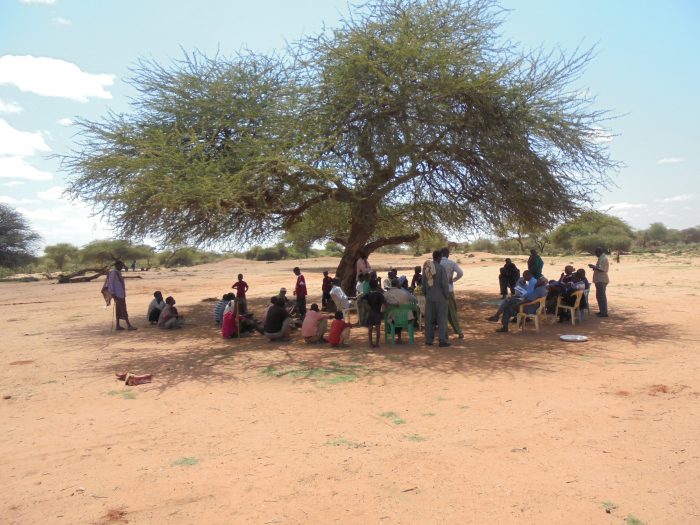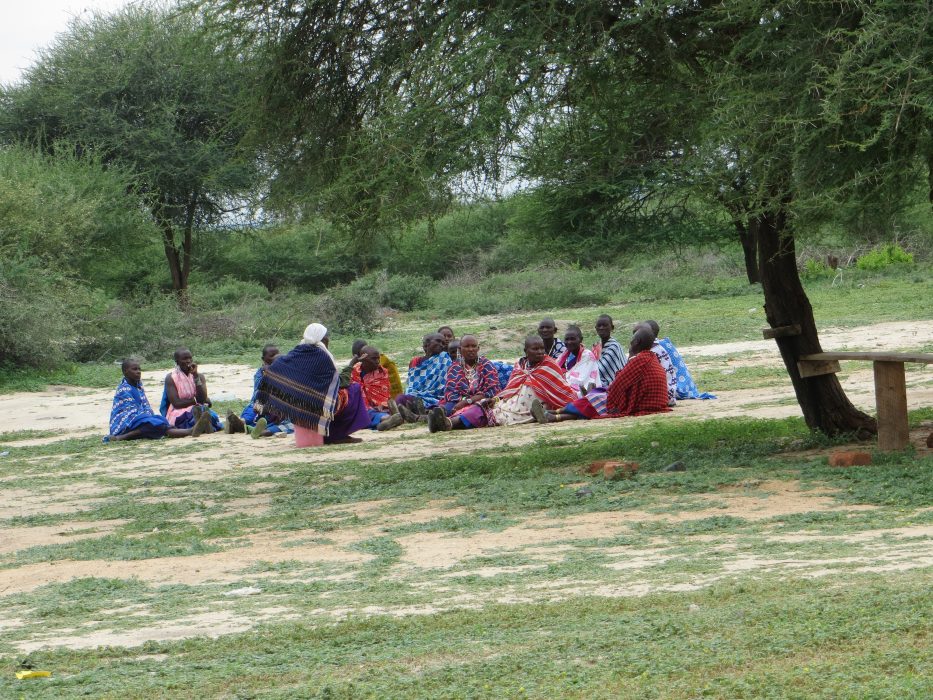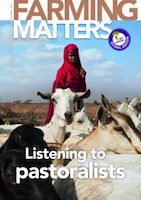Pastoral rangelands are vital to Somalia’s livestockdominated economy. But where national government is weak to non-existent, conflict over access to land is rife. Traditional common property regimes are under pressure from enclosures, population growth and charcoal production. Yet even in these very challenging situations, hybrids of customary and ‘modern’ law enable pastoralist communities to assert their rights.

Somaliland, the autonomous region of northern Somalia, is a predominantly pastoralist country. Pastoralists dominate the economy and play an important role in governance. Livestock exports account for around 90 % of export earnings, and pastoralism has the capacity to withstand and recover from droughts, thanks to mobility, large herd sizes and strong social capital. Households tend to move towards ‘pastoralism +’ – maintaining traditional livestock keeping while taking on new activities like agriculture. Some 30 % of the population are now agro-pastoralists, 54 % remain semi-mobile pastoralists, and 16 % are urban residents.
Sources of conflict
Common property systems and customary law prevail in the rangelands, while private property and ‘modern’ law are the norm in urban areas. In agro-pastoral areas, a combination of the traditional and modern models prevail. These regulatory mechanisms support export-oriented pastoralism and a healthy private sector. But in recent years, they are under strain due to rapid population growth, an expatriatefuelled real estate boom, and increasing government intervention. Weakening customary law means more environmentally destructive charcoal production, more enclosures on rangelands, and new settlements established by urban and expatriate investors.
Communities empowered
There is always a decision to make, and at the local level, village committees are responsible. Committee heads handle everything from minor personal disputes to large land issues. They consult widely, and on bigger issues also with traditional leaders, aqils and sultans, hereditary clan or sub-clan positions. All is governed by traditional Somali law (Xeer) with clear rules for land management, but village heads face many issues for which Xeer does not provide straightforward answers.
A recent story from Dheenta shows how resource use was negotiated by a strong, capable and progressive village committee, representing and respected by its community. The committee has authority to allocate land and oversee transactions, working with district and central governments but has the power to overrule them. Hargeisa’s Amal Construction Company began quarrying around Dheenta in 2014, and approached the village committee for permission to use bulldozers. This was granted on condition that impacts would be limited. But when grazing land was damaged, the committee told Amal to stop work. Discussions followed, and Amal was allowed to resume operations only when they agreed to employ and train local youth and abide by new rules to protect farms, pasture, shrubs and water points.
Somaliland
Somaliland celebrated 25 years of independence in May 2016. Not bad for a country that doesn’t officially exist! Once British Somaliland, it joined with the former Italian Somalia in 1960, but declared independence after the government collapsed in 1991. It has its own currency, customs, passports and EU-monitored free and fair elections, but remains unrecognised by the international community. Puntland to the east is also semi-autonomous, meaning the Mogadishu government effectively governs only (parts of) south Somalia. Neighbouring French Somaliland became the Republic of Djibouti in 1977.
Power relations underlie land governance in Somaliland. Governments, elites and vested interests wield power to seize land from communities. But, powerful clans and an armed population resist ‘land grabbing’ and can frustrate infrastructure development. The government claims ultimate ownership of land and issues titles and deeds, but cannot effectively oversee land sales. The government’s capacity to re-assert its authority and strengthen land use policy, laws and enforcement is severely limited. In this partial vacuum, basic functions such as maintaining a land registry are performed by UN agencies. Also, NGOs work with communities to prevent rangelands enclosures and maintain or re-establish seasonal grazing reserves. However, in many instances the success of such projects are hindered by power relations that do not favour traditional pastoralist communities. But in the eastern provinces of Sool and Sanaag gun ownership by pastoralists has enabled local people to protect their institutions, traditional culture and kinship networks.
Villagers ‘win’ again
In 2013, the government granted rights to the Turkish oil company Genel Energy for oil exploration in the pastoral heartlands of Somaliland. First greeted with enthusiasm and hopes of oil wealth, issues of land rights emerged when exploration began. PENHA (Pastoralist and Environmental Network in the Horn of Africa was conducting consultations in the pastoral village of Sanyare when the first fleet of Genel trucks came sweeping in. There was consternation. What was going on? Who were these people? Heavy vehicles damaged fodder shrubs and trees, and problems quickly deepened. Said one aggrieved local leader, “if they behave that way now, what about when they find oil?” Another implored that, “we shoot at our own people to stop them cutting acacia trees for charcoal, so how can we allows others to clear them away?”

Communities were deeply concerned about what discovery of oil would mean for their future. “We don’t know what’s underneath the ground, but we know what’s on top of it – and they are destroying it,” one elder said. “And if they find what they are looking for, how do we know that we’ll get anything out of it?” Would their land ownership be maintained? Would they have to abandon their pastoral livelihoods? If so, would they be given compensation and a share of the benefits? Tensions eventually led to armed clashes. The village committee talked with clan elders and traditional leaders in other affected communities. The consensus: shut down Genel’s operations. Local leaders told the government, and that was the end of that. Genel suspended work and pulled out in September 2013, but recently announced a desire to return, this time working alongside communities. This was welcomed, with proper consultation. In Somaliland, unlike elsewhere, local people call the shots.
Emerging hybrid institutions
Somaliland’s upper house of parliament is reserved for traditional leaders, and elsewhere we see the development of hybrid institutions that formalise roles for traditional institutions. This mix of traditional and modern law and institutions works well, allowing the development of strong Somali-owned businesses in water supply, telecommunications and aviation – sectors where foreign companies dominate in most of sub-Saharan Africa.
Traditional, common property ownership is not synonymous with ‘backwardness’ and economic stagnation
Expanding positive outcomes
Pastoralism will continue to be central to Somalia’s economy, even with the growth of service-oriented urban areas and farming. But to reduce the risk of conflict, participatory and inclusive processes for land management and land policy development must become the norm. Formal institutions need to work with traditional ones, with constructive debate and decisions made at the community level, building collaboratively towards coordinated decision-making at national and regional levels. Traditional, common property ownership is not synonymous with ‘backwardness’ and economic stagnation. Traditional institutions are compatible with progress, and traditional leaders are not opposed to change. They are ready to negotiate, and to participate in designing new approaches.
Sadia Ahmed (penhasom@gmail.com) is country director for PENHA-Somaliland, Hargeisa, Somaliland. John Livingstone is policy and research officer, Amsale Shibeshi is regional programmes coordinator, and Nick Pasiecznik is research associate.
This article builds on a paper by Sadia Ahmed and John Livingstone, ‘New participatory approaches to land governance and conflict resolution in Somaliland’, presented at the International Resilience, Research and Innovation Conference, Djibouti, 26-28 October 2015.


